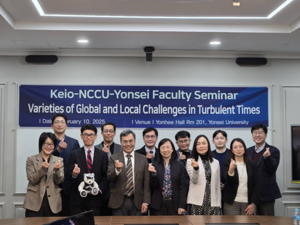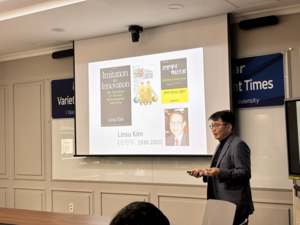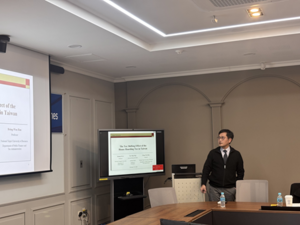Annual NCCU-Yonsei-Keio Social Sciences Forum Successfully Held




Date :
2025-02-24
Department :
College of Social Sciences
【Article by College of Social Sciences (CSS)】
Since 2023, the social sciences faculties of National Chengchi University (NCCU) in Taiwan, Keio University in Japan, and Yonsei University in South Korea have committed to holding an annual faculty-level academic symposium at each institution in rotation. This year's event was hosted by Yonsei University on February 10. Representing NCCU were Dean Wan-Ying Yang, Associate Deans Philip Hsiaopong Liu and Vance K.T. Lo, along with Professor Tzung-wen Chen from the Department of Sociology.
The first session of the conference featured a presentation by Professor Akiko Sugiki from the Department of Political Science at Keio University. Drawing from her multiple field investigations at the Dadaab refugee camp in Kenya, she argued that when the number of refugees reaches a critical mass, it significantly impacts local politics and society, making it difficult to implement international legal protections for refugees. Professor Inbok Rhee from Yonsei University's Department of Political Science examined perceptions of racial discrimination in the United States across different Asian countries with varying degrees of closeness to the U.S. He found that nations with stronger ties to the U.S. were more sensitive to issues of racial discrimination in American society.
The final presentation of the session, delivered by Professor Tzung-wen Chen from NCCU’s Department of Sociology, captivated the audience. He deconstructed the innovation process within East Asia’s semiconductor industry, challenging the common perception that Korea and Taiwan merely copied chip assembly techniques from the 1970s. He argued that assembly involves the integration of form, concept, and value, as well as the evolution of manufacturing principles, problem-solving models, human-machine interactions, and organizational structures. These factors have enabled Samsung and TSMC to emerge as global leaders at different levels, shaping East Asia’s unique and irreplaceable model of innovation.
The second session commenced with Professor Hiroshi Okayama from Keio University’s Department of Political Science, who explored the persistence of the two-party system in the United States. He highlighted how, from the mid-20th century onward, American society began to view this system as an institution requiring active preservation. Since the 1970s, electoral rules have increasingly been designed not only to suppress third-party competition but also to prevent the fragmentation of the political system.
Following this, Professor Vance K.T. Lo from NCCU examined whether Taiwan’s housing hoarding tax has led to rent-shifting effects. His findings indicated that while excessive rent hikes occurred in some regions, others showed no significant increases, demonstrating that policy impacts vary by location. He suggested that local governments should have the autonomy to set tax rates, promote rental contract registration to improve data accuracy, and adjust the property tax base to better reflect market values.
The session concluded with Professor Myung-Ae Choi from Yonsei University’s Department of Anthropology, who presented on "Rewilding Seoul." She introduced the concept of integrating urban environments with wildlife as an experimental and multi-species conservation model. She emphasized that future human narratives should focus less on disaster and extinction and instead highlight the resilience and coexistence of multiple species within urban ruins.
In her closing remarks, Dean Wan-Ying Yang underscored that the research presented by scholars from the three universities vividly demonstrated that in addressing the dual challenges of globalization and localization, transnational academic collaboration is key to problem-solving. She emphasized that this academic exchange in Seoul has not only strengthened NCCU’s ties with academic institutions in Japan and Korea but also laid the groundwork for future research collaborations and student exchanges. She concluded by announcing that the next trilateral academic exchange will be hosted by NCCU in February next year.
Since 2023, the social sciences faculties of National Chengchi University (NCCU) in Taiwan, Keio University in Japan, and Yonsei University in South Korea have committed to holding an annual faculty-level academic symposium at each institution in rotation. This year's event was hosted by Yonsei University on February 10. Representing NCCU were Dean Wan-Ying Yang, Associate Deans Philip Hsiaopong Liu and Vance K.T. Lo, along with Professor Tzung-wen Chen from the Department of Sociology.
The first session of the conference featured a presentation by Professor Akiko Sugiki from the Department of Political Science at Keio University. Drawing from her multiple field investigations at the Dadaab refugee camp in Kenya, she argued that when the number of refugees reaches a critical mass, it significantly impacts local politics and society, making it difficult to implement international legal protections for refugees. Professor Inbok Rhee from Yonsei University's Department of Political Science examined perceptions of racial discrimination in the United States across different Asian countries with varying degrees of closeness to the U.S. He found that nations with stronger ties to the U.S. were more sensitive to issues of racial discrimination in American society.
The final presentation of the session, delivered by Professor Tzung-wen Chen from NCCU’s Department of Sociology, captivated the audience. He deconstructed the innovation process within East Asia’s semiconductor industry, challenging the common perception that Korea and Taiwan merely copied chip assembly techniques from the 1970s. He argued that assembly involves the integration of form, concept, and value, as well as the evolution of manufacturing principles, problem-solving models, human-machine interactions, and organizational structures. These factors have enabled Samsung and TSMC to emerge as global leaders at different levels, shaping East Asia’s unique and irreplaceable model of innovation.
The second session commenced with Professor Hiroshi Okayama from Keio University’s Department of Political Science, who explored the persistence of the two-party system in the United States. He highlighted how, from the mid-20th century onward, American society began to view this system as an institution requiring active preservation. Since the 1970s, electoral rules have increasingly been designed not only to suppress third-party competition but also to prevent the fragmentation of the political system.
Following this, Professor Vance K.T. Lo from NCCU examined whether Taiwan’s housing hoarding tax has led to rent-shifting effects. His findings indicated that while excessive rent hikes occurred in some regions, others showed no significant increases, demonstrating that policy impacts vary by location. He suggested that local governments should have the autonomy to set tax rates, promote rental contract registration to improve data accuracy, and adjust the property tax base to better reflect market values.
The session concluded with Professor Myung-Ae Choi from Yonsei University’s Department of Anthropology, who presented on "Rewilding Seoul." She introduced the concept of integrating urban environments with wildlife as an experimental and multi-species conservation model. She emphasized that future human narratives should focus less on disaster and extinction and instead highlight the resilience and coexistence of multiple species within urban ruins.
In her closing remarks, Dean Wan-Ying Yang underscored that the research presented by scholars from the three universities vividly demonstrated that in addressing the dual challenges of globalization and localization, transnational academic collaboration is key to problem-solving. She emphasized that this academic exchange in Seoul has not only strengthened NCCU’s ties with academic institutions in Japan and Korea but also laid the groundwork for future research collaborations and student exchanges. She concluded by announcing that the next trilateral academic exchange will be hosted by NCCU in February next year.


 Fax:886-2-29379611
Fax:886-2-29379611